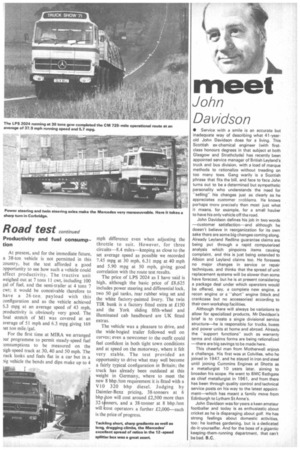Road test continued Productivity and fuel consumption At present, and
Page 63

If you've noticed an error in this article please click here to report it so we can fix it.
for the immediate future, a 38-ton vehicle is not permitted in this country, but the test afforded a good opportunity to see how such a vehicle could affect productivity. The tractive unit weighed out at 7 tons 11 cwt, including 100 gal of fuel, and the semi-trailer at 4 tons 7 cwt: it would be conceivable therefore to have a 26-ton. payload with this configuration and as the vehicle achieved 6.3 mpg at an average speed of 43 mph, productivity is obviously very good. The final stretch of M1 was covered at an average of 51 mph and 6.3 mpg giving 169 set ton mile /gal.
For the first time at MIRA we arranged )ur programme to permit steady-speed fuel :onsumptions to be measured on the sigh-speed track at 30, 40 and 50 mph. The rack looks and feels flat in a car but in a lig vehicle the bends and dips make up to 4
mph difference even when adjusting the throttle to suit. However, for three circuits-8.4 miles—keeping as close to the set average speed as possible we recorded 7.45 mpg at 30 mph, 6.31 mpg at 40 mph and 5.90 mpg at 50 mph, giving good correlation with the route test results.
The price of LPS 2024 as I have said is high, although the basic price of 18,625 includes power steering and differential lock, two 50 gal tanks, rear rubber wing set and the white factory-painted livery. The twin TIR bunk is a factory fitted extra at £150 and the York sliding fifth-wheel and illuminated cab headboard are UK fitted extras.
The vehicle was a pleasure to drive, and the wide-bogied trailer followed well on curves; even a newcomer to the outfit could feel confident in both tight town conditions and at speed on the motorway, where it felt very stable. The test provided an opportunity to drive what may well become a fairly typical configuration in Britain; the truck has already been outdated at this weight in Germany, where to meet the new 8 bhp /ton requirement it is fitted with a VIO 320 bhp diesel. Judging by Daimler-Benz pricing, 38-tonners at 6 L bhp ton will cost around £2,500 more than 32-t nners, and a 38-tonner at 8 bhp /ton will ost operators a further f2,000—such is the price of progress.




















































































































